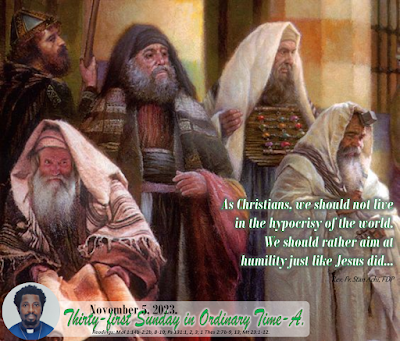RELIGIOSITY: LIVE BY MODEL, NOT BY WORDS.
November 5, 2023.
Thirty-first Sunday in Ordinary Time – A.
Readings: Mal 1:14b-2:2b, 8-10; Ps 131:1, 2, 3; 1 Thes2:7b-9, 13; Mt 23:1-12.
“…Do and observe all things whatsoever they tell you, but do
not follow their example. For they preach but they do not practice.” Mt 23:3
A Turkish proverb says: “As the crow tried to imitate the
partridge, it forgot its own walking style.” A Nigerian proverb adds: “If one
imitates the upright, one becomes upright; if one imitates the crooked, one
becomes crooked.”
There has always been a great tension between two categories
of religiosity and religious leaders. On one side, we have those people tagged
as Traditionalists or Conservatives (averse to change and who hold traditional
values), and on the other side, we have the Progressivists or Modernists (those
who hold that it is possible to improve human societies through reforms). The
first group focuses on the orthodoxy of practices and the praxis, while the
other speaks of adaptation and openness to new realities.
Someone tried to define Traditionalism and Progressivism in
this imagery: "Traditional schools focus on the teacher and what they
teach while progressive schools focus on the students and how they can
learn."
There is a current silent revolution ongoing in the Church
between traditional conservatives and the progressives. These days, we read and
hear in the media the reactions of some people, among them Bishops, Cardinals,
Priests, and Lay people about Pope Francis' way of leading the Church and the
reforms he introduced. The comments and criticisms grew stronger with the
recent Synod on Synodality, lighting again the famous "Five Dubia".
The questions concerning the interpretation of Divine Revelation, the blessing
of same-sex unions, synodality as a constitutive dimension of the Church, the
priestly ordination of women, and repentance as a necessary condition for
sacramental absolution.
Many more questions could arise. But the solo answer can be
found in today's liturgy, especially in the Gospel, where Jesus speaks about
the Scribes and the Pharisees.
As Christians, the Word of God today should cause us to
reflect, especially those in authority in our communities and Churches. We
should ask ourselves if by any chance we resemble the priests described in the
first reading, the people who do not listen truly to God, people who have
turned aside from the right way, and consequently, caused many to stumble in
their faith due to their instructions and teachings. The Prophet Malachi says
that they have corrupted the word of God and transformed it at their convenience.
And the worst is that they know what is right. They even teach what is the
right and sound doctrine but their lives are in perfect and complete opposition
or disconnection with their teachings.
Hence, come the tough words of Jesus himself against the
Scribes and the Pharisees in the Gospel. And it once again calls us to examine
ourselves. For, these words may well be addressed to you and me. Is our life in
accord with our teaching? We know the famous saying: "Do as I say, not as
I do." But the truth is that this admonition is an acknowledgment that the
speaker is being a hypocrite. He acknowledges that his actions are in direct
opposition to his words and that he is not upholding the standards he demands
from others. And that is what the Lord reproaches to the Scribes and the
Pharisees. They are teachers of the Law. They know well and more than anyone
else the Law of Moses but they live in opposition to it. What they forbid
others is what they do themselves. So, Jesus says: "Do and observe all
things whatsoever they tell you, but do not follow their example. For they
preach but they do not practice..." He explicitly points out their
hypocrisy. "All their works are performed to be seen."
As Christians, we should not live in the hypocrisy of the
world. We should rather aim at humility just like Jesus did. He was not
ostentatious but humble and true to his words and actions.
St. Paul stands also as another model for us. He and his
companions gave great examples of Christian life and discipline to the Thessalonians.
Not only did they give them the Word of God as it truly is, but they also did
all to apply these words to their own self, striving not to be a burden to the
believers.
Listening to Paul's words, I do question our Churches,
communities, and parishes today. Can we, Church leaders and priests, affirm
like Paul that we are not a burden to any of the believers? Are we gentle with
our parishioners "as a nursing mother cares for her children"? Do we show them enough affection, sympathy,
closeness, and love?
The word of God should challenge us primarily, pastors and leaders. We are to live by example. Our ways should not tell the people "Do what I say, but do not imitate what I do." Any inconsistency or dualistic manner will affect God's Word that we preach. Let's not forget that today's people need more models than teachers, and if they listen to teachers, it is because they see in them models to imitate. Let's end with this warning we hear from Malachi: "If you do not listen, if you do not lay it to heart, to give glory to my name, says the Lord of hosts, I will send a curse upon you and of your blessing I will make a curse..."





Comments
Post a Comment